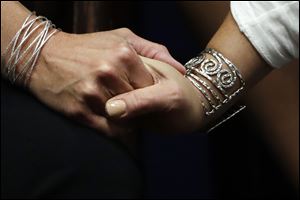
Making 'never again' possible
8/25/2018
Victims of clergy sexual abuse and their family members react as Pennsylvania Attorney General Josh Shapiro speaks during a news conference at the Pennsylvania Capitol in Harrisburg, Pa., on Aug. 14.
A grand jury report on sexual abuse of children by Catholic priests in Pennsylvania includes a handful of recommendations intended to give victims a measure of justice and prevent others from becoming victims in the future.
Most of the recommendations are worth consideration, but a wider national discussion must be had and many reform ideas should be put on the table. For 15 years the church and the people of America have been saying “never again” about clergy child abuse. We need to think hard, talk openly and at long length, and strengthen our wills: How do we actually make it so?
RELATED: Grand jury report vividly depicts horrors of clergy sex abuse
Many are calling for lifting the statute of limitations on clergy sex abuse. But any end to the statute of limitations for sexual offenses or any strengthening of child-abuse reporting requirements must apply to all groups, not only the Catholic Church.
The church has been rightly excoriated for the predators within its ranks and for bishops’ efforts to cover up those offenses. But we know that sexual abuse of children occurs in other religious denominations and in college athletic programs and public schools, among other settings.
There is statute of limitations for all crimes except murder, and it exists because justice over long periods of time is hard to achieve — evidence is lost, witnesses die, and memories become clouded. The statute exists for a reason. The justice system is supposed be fair to the accused.
And there is the practical matter that many of the abusers are dead, so holding them accountable is cold comfort,
There are other reforms that ought to be considered.
● Clearly the church needs to take more care in screening people for the priesthood. And the spiritual formation, and psychological and intellectual training of seminarians must be more rigorous.
● The possibilities of civil litigation should be expanded, including over more, but not unlimited, time. It might be that civil lawsuits, including class action suits, make more sense than criminal investigations. They would hold the institutions, rather than deceased abusers, accountable, and hit them where they feel it — the treasury.
● A third reform would be for the church itself to appoint special civilian magistrates to monitor the progress various dioceses are making both with prevention of child abuse and clergy and hierarchical accountability. The federal courts often impose such outside authority on failing schools, jails or prisons. The same approach could be used in the church, with the church itself making the appointment, since under the First Amendment and the doctrine of church-state separation, no court could.
Click here to view more Blade editorials
Finally, Pope Francis provides a model and a way forward. In the case of the many instances of abuse in Chile, the pope, at first, did not believe the accusers — one of the accused was his friend. It seemed unimaginable to him that his friend could be a child abuser. But the pope did four things: He looked at the evidence. He met with (for many hours), prayed with, and some cases wept with, the abused. He changed his mind. And he fired some people in authority.